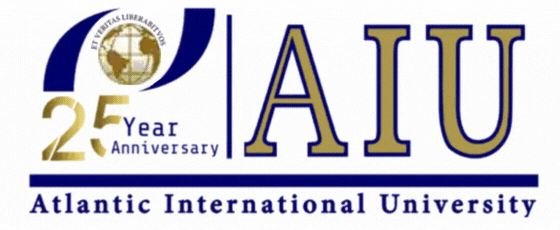- RESEARCHDistance Learning at AIU is enhanced by vast academic resources and innovative technologies build into the Virtual Campus: Hundreds of self-paced courses with video lectures and step by step lessons, thousands of optional assignments, 140,000 e-books, the Social Media & Networking platform allowing collaboration/chat/communications between students, and MYAIU develop students holistically in 11 areas beyond just academics.
- PROGRAMS OFFERED
- Areas of Study
- Courses and Curriculum
- Open Courses
- Register for a Program
- Associate Program
- Associate in Addiction Counseling
- Associate in Agriculture Food And Resources
- Associate in Anti Terrorism Security
- Associate in Behavior Analysis In Special Education
- Associate in Bioethics
- Associate in Climatology
- Associate in Cultural Theological Communication
- Associate in Culinary Arts
- Associate in Ecotechnology
- View all Associates Programs
- Bachelor Program
- Bachelors in Community Development
- Bachelors in Environmental Science
- Bachelor in Education (B.Ed, BS)
- Bachelors in Economics
- Bachelors in Entrepreneurship
- Bachelors in Financial Administration
- Bachelors in Human Resource Management
- Bachelors in Linguistics
- Bachelors in Nutritional Science
- Bachelors in Occupational Health and Safety
- Bachelors in Psychology
- View all Bachelor Programs
- Doctorate Program
- Doctor | of Biology (PhD)
- Doctorate in Business Administration (DBA, PhD)
- Doctor of Economics (PhD)
- Doctor of Electrical Engineering (D.Sc, PhD)
- Doctor of Finance (PhD)
- Doctorate in International Relations
- Doctorate in Information Technology (D.Sc)
- Doctor of Legal Studies (PhD)
- Doctor of Project Management (PhD)
- Doctor of Sociology (PhD, D.Sc)
- Doctorate in Sustainable Natural Resources Management
- View all Doctorate Programs
- Master Program
- Postdoctoral Program
- Postdoctoral in Animal Science
- Postdoctoral in Anti Terrorism Security
- Postdoctoral in Behavior Analysis In Special Education
- Postdoctoral in Bioethics
- Postdoctoral in Blockchain Technology and Digital Currency
- Postdoctoral in Business Management
- Postdoctoral in Cloud Computing
- Postdoctoral in Computer Engineering
- View all Postdoctoral Programs
AIU offers a wide range of majors in areas including the Arts, Business, Science, Technology, Social, and Human studies. More than 120 degrees and programs are available for adult learners at the associate’s, bachelor’s, master’s, doctoral and postdoctoral level. - VIRTUAL CAMPUS
Distance Learning at AIU is enhanced by vast academic resources and innovative technologies build into the Virtual Campus: Hundreds of self-paced courses with video lectures and step by step lessons, thousands of optional assignments, 140,000 e-books, the Social Media & Networking platform allowing collaboration/chat/communications between students, and MYAIU develop students holistically in 11 areas beyond just academics.
- ALUMNI
The world is YOUR campus!”, that is the message of AIU’s month magazine Campus Mundi. Hear the voices and see the faces that make up AIU. Campus Mundi brings the world of AIU to you every months with inspirational stories, news and achievements by AIU members from around the world (students and staff are located in over 200 countries).
Educational Psychology
Enhancing Teaching and Classroom Management through Educational Psychology
The document explores the significance of educational psychology in secondary schools in Botswana, highlighting its role in understanding learning processes and behaviors. It emphasizes the need for teachers to adapt their methods to individual learners, fostering positive classroom environments and effective management strategies to enhance student engagement and success.
Click Here: Get access to AIU

The document titled “Using Educational Psychology to Support Teaching and Classroom Management in Secondary Schools of Botswana” delves into the critical role of educational psychology in enhancing teaching practices and classroom management. It begins by outlining the purpose of the topic, emphasizing the importance of understanding the diverse learning needs of students, particularly those with specific learning challenges such as ADHD, autism, dyscalculia, and dyslexia.
The text highlights that teachers equipped with knowledge of educational psychology can better comprehend their students’ individual strengths, weaknesses, and challenges. This understanding enables educators to create attractive, safe, and conducive learning environments. The goals of classroom management are discussed, focusing on fostering positive teacher-student and peer relationships, managing student groups to maintain on-task behavior, and employing counseling and psychological methods to support students facing psychosocial issues.
Furthermore, the document explains that educational psychology is informed by neuroscience, which studies cognitive processes such as memory and conceptualization. This knowledge is essential for teachers as it allows them to present information in ways that are more beneficial for students, ultimately promoting educational success for all.
The analysis section addresses various perspectives within educational psychology, including behaviorism, cognitivism, social constructivism, and developmental psychology. Behaviorism, particularly operant conditioning, is emphasized as a method for influencing behavior change through rewards and punishments. However, the document also notes the limitations of this approach, such as the potential reduction of intrinsic motivation and the risk of reverting to old behaviors in the absence of reinforcement.
The text discusses the paradigm shift in educational philosophy, moving away from traditional views of learners as passive recipients of knowledge. Modern educational practices recognize individual differences among learners and advocate for child-centered approaches that prioritize active engagement and collaboration. The integration of cognitive and social constructivist theories is highlighted, emphasizing the importance of peer collaboration in the learning process.
In conclusion, the document reiterates that educational psychology is fundamental for teachers, as it enhances their understanding of learning processes and behaviors. Educators are portrayed as change agents capable of influencing student behavior and making lasting impacts on their lives. The text advocates for the application of educational psychology principles to improve classroom management and foster positive learning environments, ultimately benefiting all students.
Atlantic International University
Get to know the AIU experience
Contact Us Today!
We understand how busy adults do not have time to go back to school. Now, it’s possible to earn your degree in the comfort of your own home and still have time for yourself and your family. The Admissions office is here to help you, for additional information or to see if you qualify for admissions please contact us. If you are ready to apply please submit your Online Application and paste your resume and any additional comments/questions in the area provided.
Pioneer Plaza
900 Fort Street Mall 905
Honolulu, HI 96813
800-993-0066 (Toll Free in US)
808-924-9567 (Internationally)
808-947-2488 (Fax)
AIU Success Stories







Contact Us Today!
Begin Your Journey!
AIU’s Summer of Innovation and Growth gives you the ability to earn up to $5000 in tuition credit by completing free lessons and courses.
Whether you’re looking to acquire new skills, advance your career, or simply explore new interests, AIU is your gateway to a world of opportunities. With free access to 3400 lessons and hundreds of courses the ability to earn credits and earn certificates there’s no better time to start learning.
Join us today as a Guest Student and take the first step towards a brighter, more empowered future.
Explore. Learn. Achieve.
Degrees

Contact Us
Atlantic International University
900 Fort Street Mall 905 Honolulu, HI 96813 [email protected]
Quick Links
Home | Online Courses | Available Courses | Virtual Campus | Career Center | Available Positions | Ask Career Coach | The Job Interview | Resume Writing | Accreditation | Areas of Study | Bachelor Degree Programs | Masters Degree Programs | Doctoral Degree Programs | Course & Curriculum | Human Rights | Online Library | Representations | Student Publication | Sponsors | General Information | Mission & Vision | School of Business and Economics | School of Science and Engineering | School of Social and Human Studies | Media Center | Admission Requirements | Apply Online | Tuition | Faculty & Staff | Distance Learning Overview | Student Testimonials | AIU Blogs | Register for Program | Privacy Policy | FAQ



















